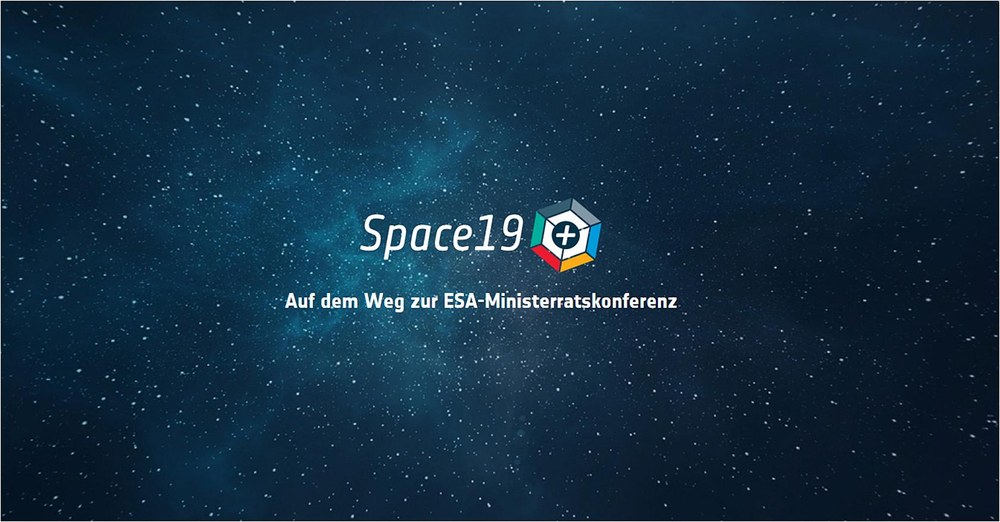Space 19+ – Space for Europe – Made in Germany
- The ESA Council Meeting at Ministerial Level will take place in Seville, Spain on 27 and 28 November 2019.
- The meeting will determine the course of European space activities over the next three to five years.
- At the last Council Meeting at Ministerial Level, Germany contributed 479 million euro to the application programmes and is planning a considerable increase.
- Focus: Space, space policy
On 27 and 28 November 2019, the ministers responsible for space activities and representatives of the European Space Agency (ESA) Member States sent by their respective governments will convene in Seville, Spain, to determine the course of European space activities over the next three to five years. This meeting has been given the name Space19+. The German delegation will be led by Thomas Jarzombek, a member of the Federal Parliament and Federal Government Coordinator of German Aerospace Policy. Preparations for the conference are gathering pace at the German Aerospace Center (Deutsches Zentrum für Luft- und Raumfahrt; DLR) Space Administration in Bonn. Walther Pelzer, a Member of the DLR Executive Board and Head of the Space Administration, and his team are responsible for preparing the materials needed by the German delegation and coordinating them with the Federal Government and ESA.
"At the last Ministerial Council Meeting, which was held in 2016 in Lucerne, Germany committed approximately 1.9 billion euro as its contribution to ESA programmes over the 2017-2019 period, making it the second largest contributor and partner for European space endeavours after France," explains Walther Pelzer, adding: "For the negotiations in Seville, we have drafted a cabinet proposal that envisages a significant increase; the Federal Government will make its decision on 13 November 2019."
Germany is boosting the Small and Medium-sized Enterprise (SME) sector of its space industry with a strong focus on application and technology programmes. From a German perspective, the outcome of the meeting in Seville should give rise to opportunities for innovation, agility and NewSpace – that is, specific programmes and strategies that include start-ups and SMEs. The benefits that space research can bring to individuals and society at large, coupled with the potential for addressing new markets – through added value and technology transfer – must be at the forefront, in line with the Federal Government's funding, space and high-tech strategies. "We remain committed to independent European access to space and to our obligations regarding the operation of the ISS. Global developments in the space industry are tending towards increased competition and commercialisation, but this – more than ever – makes it necessary to provide even better support and integration for German space research and the space industry, particularly SMEs and start-ups," says Pelzer.
The Business Applications and Space Solutions (BASS) programme is designed to support and commercialise marketable and commercially sustainable services and applications across all industries. In addition, space enterprises are able to network with established industrial companies, generating spill-over effects. At the last Ministerial Council Meeting, Germany contributed 479 million euro to the application programmes and is planning a considerable increase.
Germany is expanding its commitment to climate protection by building upon its leading role in Earth observation – both scientifically and technologically and in the processing and utilisation of data required to analyse the planet. In addition, Germany is an important partner in the European Union Copernicus programme and will play a major role in ongoing operations and expansion. Its agenda also includes Earth observation applications for sustainable development and stronger global development cooperation.
By presenting its plans in Seville, Germany is seeking to drive innovation amongst German SMEs and promote expertise in research institutions and universities. The aim is to close gaps in technological development, thus boosting international competitiveness. In this case, the focus is on the development of core technologies and components for future missions. These include the digitalisation of production cycles and technologies for the sustainable use of space, as well as Industry 4.0-compatible manufacturing methods and additive manufacturing technologies (3D printing), robotics and modern sensor technology. Another key element is laser communication as a market for future expansion. Maintaining and expanding Germany's leading position in this area is a key objective of the country's space strategy. This is why Germany has an interest in the HydRON optical communications network, which connects both terrestrial and satellite users. Important elements of a European quantum communications network based on Quantum Key Distribution (QKD) will also be developed and demonstrated, to achieve unprecedented security in data transmission.
Germany is participating in the international lunar programme. With the development and construction of the European Service Module (ESM) – Made in Germany – in Bremen, the nation is already 'on its way to the Moon'. Together with NASA's Orion capsule, the ESM forms the space vehicle that will transport astronauts into lunar orbit and is therefore a key element of NASA's Artemis Program, the USA’s lunar exploration initiative for the coming decade. Germany's strong commitment to the International Space Station (ISS) complements this work, as it is here that the groundwork is performed to enable humans to live, work and conduct research on the Moon.

